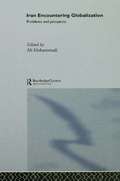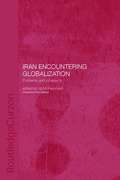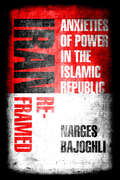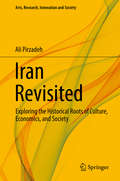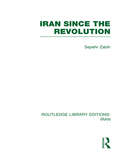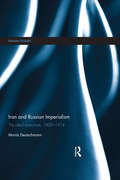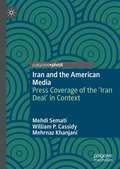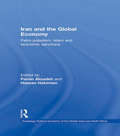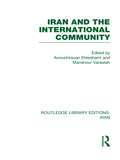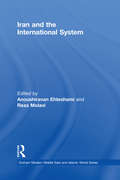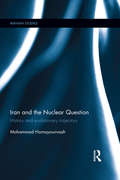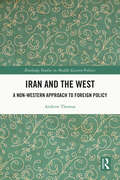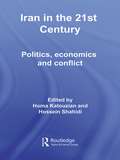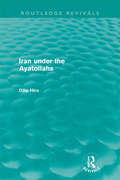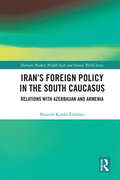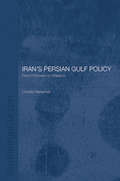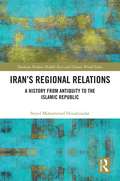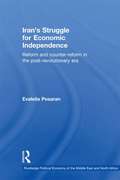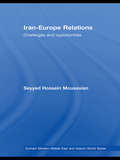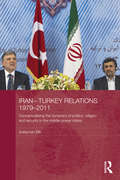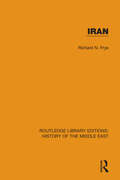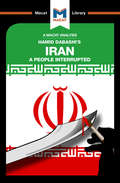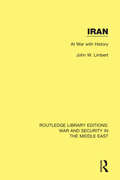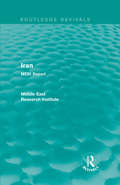- Table View
- List View
Iran Encountering Globalization: Problems and Prospects
by Ali MohammadiWith new material and up-to-date information, this book examines the current state of Iran, exploring a wide range of areas including the economy, finance, politics, the media, and the position of women and migration. Iran Encountering Globalization discusses the uneasy balance between the theocratic conservatism, modernization and globalization. This is a key tension in Iran - one which has arisen following the revolution of 1979, since the regime has worked to Islamicize the country, while at the same time international globalization forces have been pulling in a different direction. Concluding that forces for change in Iran are currently building up, this is an extremely topical book that makes an important contribution to current debates surrounding democracy in Iran.
Iran Encountering Globalization: Problems and Prospects
by Ali MohammadiThis text examines the current state of Iran, looking at a wide range of areas including the economy, finance, politics, the media, the position of women and migration. The book discusses the uneasy balance between the theocratic conservatism, modernisation and globalization, concluding that forces for change in Iran are building up.
Iran Reframed: Anxieties of Power in the Islamic Republic (Stanford Studies in Middle Eastern and Islamic Societies and Cultures)
by Narges BajoghliAn inside look at what it means to be pro-regime in Iran, and the debates around the future of the Islamic Republic. More than half of Iran's citizens were not alive at the time of the 1979 Revolution. Now entering its fifth decade in power, the Iranian regime faces the paradox of any successful revolution: how to transmit the commitments of its political project to the next generation. New media ventures supported by the Islamic Republic attempt to win the hearts and minds of younger Iranians. Yet members of this new generation—whether dissidents or fundamentalists—are increasingly skeptical of these efforts. Iran Reframed offers unprecedented access to those who wield power in Iran as they debate and define the future of the Republic. Over ten years, Narges Bajoghli met with men in Iran's Revolutionary Guard, Ansar Hezbollah, and Basij paramilitary organizations to investigate how their media producers developed strategies to court Iranian youth. Readers come to know these men—what the regime means to them and their anxieties about the future of their revolutionary project. Contestation over how to define the regime underlies all their efforts to communicate with the public. This book offers a multilayered story about what it means to be pro-regime in the Islamic Republic, challenging everything we think we know about Iran and revolution.
Iran Revisited
by Ali PirzadehThis book examines Modern Iran through an interdisciplinary analysis of its cultural norms, history and institutional environment. The goal is to underline strengths and weaknesses of Iranian society as a whole, and to illustrate less prescriptive explanations for the way Iran is seen through a lens of persistent collective conduct rather than erratic historical occurrences. Throughout its history, Iran has been subject to many studies, all of which have diagnosed the country's problem and prescribed solutions based on certain theoretical grounds. This book intends to look inward, seeking cultural explanations for Iran's perpetual inability to improve its society. The theme in this book is based on the eloquent words of Nasir Khusrau, a great Iranian poet: "az mast ki bar mast". The words are from a poem describing a self-adoring eagle that sees its life abruptly ended by an arrow winged with its own feathers--the bird is doomed by its own vanity. The closest interpretation of this idiom in Western Christian culture is "you reap what you sow", which conveys a similar message that underlines one's responsibility in the sense that, sooner or later, we must face the choices we make. This would enable us to confront - and live up to - what Iran's history and culture have taught us.
Iran Since the Revolution (Routledge Library Editions: Iran)
by Sepehr ZabirSince the turn of the century Iran has experienced three major political upheavals in the struggle to democratize her political systems. The last revolution inaugurated an era of unprecedented turmoil and instead of fulfilling its democratic aim, paved the way for an even more despotic theocracy. To put the revolution in a proper perspective, some attempt is made to explain the reasons for Khomeini’s success in acquiring first, the symbolic leadership of the anti-Shah revolution, and then, the monopolistic control of power in Iran. How and why the other claimants to power were shunted aside and later brutally repressed is a further theme for discussion. The domestic and external ramifications of the revolution are examined in detail; in particular the rise of the anti-American feeling which culminated in the hostage crisis. In conclusion, an analysis is offered of the instrumentalities of power available to the Islamic Republic, and several scenarios are explored in which Iran’s competing forces may converge to determine whether this third revolution will finally succeed in subordinating political authority to popular democratic consent.
Iran Under the Pahlavi Monarchy: Essays in Iranian History, Politics, Culture and Literature (Iranian Studies)
by Homa KatouzianBringing together eighteen essays from Homa Katouzian, this book explores Iranian history, politics, culture and Persian literature from mediaeval times through the nineteenth century and into the contemporary period.Beginning with an overview of mediaeval Iranian history, the book then considers developments in the nineteenth century leading to the Constitutional Revolution of 1906-1911, which resulted in the fall of the Qajar dynasty (1785-1925). This is followed by a comprehensive overview of the Pahlavi monarchy (1925-1979) and a new and original analysis of the Iranian Revolution of February 1979. The book also includes essays on modern and classical Persian literature, encompassing Persian poetry and politics (1919-1925), the hitherto unstudied humour in Sadeq Hedayat’s life and works, a critical study of Forugh Farrokhzad, a study of Persian literary devices with special reference to the great Persian classic Sa‘di, and a study of Sa‘di as a lover of beauty and advocate of human morality.The book analyses Iran in a way that has seldom been done in one single volume – the history of the Qajar and Pahlavi dynasties, the two great revolutions in the twentieth century, and the unfamiliar nature of state and society in Iranian history, as well as some of the high points in modern and classical Persian literature – and is vital reading for anyone interested in the Middle East.
Iran and Russian Imperialism: The Ideal Anarchists, 1800-1914 (Iranian Studies)
by Moritz DeutschmannRather than a centralized state, Iran in the nineteenth century was a delicate balance between tribal groups, urban merchant communities, religious elites, and an autocratic monarchy. While Russia gained an increasingly dominant political role in Iran over the course of this century, Russian influence was often challenged by banditry on the roads, riots in the cities, and the seeming arbitrariness of the Shah. Iran and Russian Imperialism develops a comprehensive picture of Russia’s historical entanglements with one of its most important neighbours in Asia. It recounts how the Russian Empire strived to gain political influence at the Persian court, promote Russian trade, and secure the enormous southern borders of the empire. Using hitherto often neglected documents from archives in Russia and Georgia and reading them against the grain, this book reveals the complex reactions of different groups in Iranian society to Russian imperialism. As it turns out, the Iranians were, in the words of the Russian orientalist Konstantin Smirnov, "ideal anarchists," whose resistance to imperial domination, as well as to centralized state institutions more generally, impacted developments in the region in the century to come. Iran’s troubled relationship with the wider world continues to be a topic of considerable interest to historians, yet little focus has been given to Russia’s historical connections to Iran. This book thus represents a valuable contribution to Iranian and Russian History, as well as International Relations.
Iran and the American Media: Press Coverage of the ‘Iran Deal’ in Context
by William P. Cassidy Mehdi Semati Mehrnaz KhanjaniThis book investigates the American media coverage of the historic nuclear accord between the Islamic Republic of Iran and the world powers, commonly known as the Iran Deal. The analysis examines the sources of news and opinion expressed about the Iran Deal in The New York Times, The Washington Post and the national newscast of broadcast networks. The empirical component uses media sociology and indexing theory to determine the extent to which the media covered the topic within a framework of institutional debates among congressional leaders, the executive branch and other governmental sources. The coverage is placed within a larger historical and interpretative framework that examines the construction of Iran in both the pre-revolution news narratives and in the post-revolution American media and popular culture. The book endeavors to reveal the place Iran occupies in the American political and cultural imagination.
Iran and the Global Economy: Petro Populism, Islam and Economic Sanctions (Routledge Political Economy of the Middle East and North Africa)
by Parvin Alizadeh Hassan HakimianThe relationship between religion and the state has entered a new phase ever since the Iranian Revolution more than three decades ago. The recent mass uprisings against autocratic rulers in the Arab world have highlighted the potency of Islamist forces in post-revolutionary societies in the region, a force arguably unlocked first by Iran’s version of the ‘spring’ three decades ago. The economic ramifications of these uprisings are of special interest at a time when the possibility of the creation of Islamic states can have implications for their economic policy and performance again. A study of the Iranian experience in itself can offer rare insights whether for its own features and characteristics or for its possible lessons and implications for recent events in the region. This book is concerned with the economic aspects and consequences of the Iranian Revolution in general and its interaction with the international economy in particular. Many studies have to date dealt with Iran’s economic challenges, policies and performance in the post-revolutionary period but its interaction with the international economy – although of growing importance – has not received sufficient attention. The contributions in this volume by experts in the field address ways in which in the span of three decades, Iran’s economy has evolved from a strong aspiration to develop an ‘independent economy’ to grappling with debilitating international economic sanctions.
Iran and the International Community (Routledge Library Editions: Iran)
by Anoush EhteshamiIn this book experts examine the main features of Iran’s foreign policy from 1980 – 1990, assessing relations with the UN, the superpowers, Europe, the GCC and Iraq. Although the Islamic revolution made Iran a significant force in the international arena, it is argued that the ending of the Cold War and the rise of Iraq as the dominant power in the Gulf are now creating a very different set of foreign policy challenges and options.
Iran and the International System (Durham Modern Middle East and Islamic World Series)
by Anoushiravan Ehteshami Reza MolaviMuch attention in the West has focused on Iran as a problem country. This book challenges the representations of Iran as a hostile regional power led by ideologues, and goes further by discussing how international relations are viewed from inside Iran itself, outlining the factors which underpin Iranian thinking on international relations and considering what role Iran, as a large and significant country in the Middle East, ought to play in a fairly constructed international system. The book is written by leading scholars and policy makers from inside, as well as from outside, Iran and includes academics with unparalleled access and insights into the world-views of the Iranian leadership. Subjects covered include: the rationale of Iran's Islamic constitution, including its electoral system, and the impact this has on international relations; Iran's view of the ideal international system, including the place therein of ethics, justice, and security; Iran's international interests, including energy needs; and relations with the West, including the clash between Iranian and Western views of the world order.
Iran and the Nuclear Question: History and Evolutionary Trajectory (Iranian Studies)
by Mohammad HomayounvashSpanning over a period of more than five decades since its inception, Iran’s nuclear programme is the most protracted civilian nuclear program in the world and one of the most politicized projects in Iran’s history. 'Iran and the Nuclear Question' offers a historiographical portrait of Iran’s early nuclear program under Mohammad Reza Shah Pahlavi. Using declassified archival material, the book thematically chronicles the program’s genesis, evolutionary trajectory, and devolution from the 1950s through to the 1970s. It also catalogues the Revolutionary Iran’s early socialization into the atom and the Islamic Republic’s gradual change of heart about nuclear energy that culminated in the incremental resuscitation of the Shah’s nuclear enterprise in the 1980s. As the first archive-based account of one of the most long-lasting and capital-intensive nuclear enterprises during the Cold War, ‘Iran and the Nuclear Question’ is a valuable resource for students and scholars of Iranian, Middle East and Security Studies. Written in a clear and accessible format, it will also appeal to those with a more general interest in Iran and its nuclear journey.
Iran and the West: A Non-Western Approach to Foreign Policy (Routledge Studies in Middle Eastern Politics)
by Andrew ThomasThis book explores non-Western approaches to foreign policy in the context of Iran in order to encourage wider consideration of non-Western scholarship in international relations.Throughout its existence IR has drawn primarily on Western thought and experience, leaving other perspectives on the periphery of discourse. As the field becomes more about contexts beyond the West, this has become a challenge for creating a truly ‘global’ field of study. Concepts like ‘national interest,’ ‘rationality’ and ‘pragmatism’ are often applied to Iran without considering what these concepts mean in the context of Iranian political identity. The aim of this book is to highlight the contemporary relevance of native Iranian and non-Western perspectives to IR analysis, returning complexity and critique to Iranian studies. To do this, the author examines four of Iran’s political encounters with the West, including its resistance to sanctions policy and negotiations surrounding its nuclear program. Ultimately, the book argues that ignoring Iranian motivations of identity has routinely resulted in missed opportunities, growing tensions and failed coercive policy.The book will prove valuable reading for students and researchers interested in international relations theory, Iranian history and Middle East studies.
Iran in the 21st Century: Politics, Economics & Conflict (Iranian Studies)
by Homa Katouzian Hossein ShahidiIran is an ancient country, an oil-exporting economy and an Islamic Republic. It experienced two full-scale revolutions in the twentieth century, the latter of which had large and important regional and international consequences, including an eight-year war with Saddam Hussein’s Iraq. And now in the twenty-first century, it confronts issues and experiences problems which have important implications for its future development and external relations. Featuring outstanding contributions from leading sociologists, social anthropologists, political scientists and economists in the field of Iranian studies, this book is the first to examine Iran and its position in the contemporary world. In developing this argument, topics examined include: social developments in the country including gender relations contemporary politics international relations relations with the US and Israel nuclear weapons and energy programmes oil and the development of the economy.
Iran under the Ayatollahs (Routledge Revivals)
by Dilip HiroFirst published in 1985, this is a comprehensive study of the Middle East's most strategic country, set against the background of the Islamic heritage of Iran and the rise and fall of the Pahlavi dynasty. Dilip Hiro describes the various phases through which the Islamic revolution has passed, gives an incisive account of the first Gulf War, and provides an historical survey of Iran's relations with the West, the Soviet bloc, and other countries of the region.
Iran's Foreign Policy in the South Caucasus: Relations with Azerbaijan and Armenia (Durham Modern Middle East and Islamic World Series)
by Marzieh Kouhi-EsfahaniIran’s role as a regional power is more significant than many in the West may realise. The country lies between Central Asia/the Caucasus and the Gulf region on the one hand, and, on the other, between the Mediterranean/Levant region and South Asia. Many of these areas are of increasing strategic importance. This book explores Iran’s role as a regional power, focusing on relations with South Caucasus countries - Azerbaijan and Armenia. It outlines the historical context, including Persia’s rule of these countries before the nineteenth century, and discusses Iran’s approach to foreign and regional policy and how both internal and international factors shape these policies. The book assesses Iran–Azerbaijan and Iran–Armenia bilateral relations to demonstrate how those policies translate in Iran's regional and bilateral relations. The book concludes by considering how Iran's relations in the region are likely to develop in the future.
Iran's Persian Gulf Policy: From Khomeini to Khatami
by Dr Christin MarschallThis book examines the foreign policy of the Islamic Republic of Iran towards the states of the Persian Gulf from 1979 to 1998. It covers perceptions Iranians and Arabs have of each other, Islamic revolutionary ideology, the Iran/Iraq war, the Gulf crisis, the election of President Khatami and finally the role of external powers, such as the United States. The author argues that over the twenty-year period, the policy has moved from being ideological to pragmatic; and that by tracing its history, we can better anticipate its future relationship.
Iran's Regional Relations: A History from Antiquity to the Islamic Republic (Durham Modern Middle East and Islamic World Series)
by Seyed Mohammad HoushisadatFocusing on the interplay between domestic-level changes and region-wide interaction, this book provides a comprehensive analytical and theoretical survey of Iranian foreign relations in the Middle East from Antiquity until the Islamic Republic. It charts developments from the earliest regimes in Persia, including the Median kingdom and the Sassanid Empire, through rule by, amongst others, Abbasids, Mongols, Safavids and Qajars, up to the modern states of the Shah and the Islamic Republic. Throughout the author reflects on the enduring factors which have shaped Iran’s relations with the rest of the region, factors such as geography, culture, the belief systems of policy makers, the structures of decision-making and government, and sub-regional systems. Overall, the book provides a deep analysis of Iranian foreign relations in the Middle East over 4,700 years.
Iran's Struggle for Economic Independence: Reform and Counter-Reform in the Post-Revolutionary Era (Routledge Political Economy of the Middle East and North Africa)
by Evaleila PesaranIt is often assumed that Iran must necessarily submit to the forces of globalization and liberalize its economy, but the country’s ruling elites have continued throughout the post-revolutionary era to resist these pressures for neo-liberal economic reform, seeking to survive in the battlefield of today’s globalizing economy whilst remaining loyal to their own rules of engagement. This book analyzes the dynamics of economic reform in the Islamic Republic of Iran as they have played out in this post-revolutionary struggle for economic independence from 1979 up to the present day. It shows how, although some groups within the Iranian elite are in favor of opening up the economy to the inflow of foreign capital – believing that lasting independence requires economic growth powered in part by investment from abroad – others argue that such economic liberalization might endanger Iran’s national interests and put the survival of the post-revolutionary regime at risk. By examining the political causes of the ongoing tug-of-war that has taken place between these two sides of reform and counter-reform, this book provides a new approach to understanding the complex process of economic policy-making in the Islamic Republic of Iran, which will be relevant to future examinations of the political economy of the Middle East.
Iran-Europe Relations: Challenges and Opportunities (Durham Modern Middle East and Islamic World Series #6)
by Seyyed Hossein MousavianThis book provides an assessment of relations between Iran and Europe, identifying the areas of common interest as well as the issues of conflict, whilst putting contemporary relations into their proper context with an account of their development since the early years of the twentieth century. Written by a former diplomat who served as the first Iranian ambassador to post-reunification Germany, this book shows that despite the recent deterioration of relations between Iran and the West, Iran has enjoyed a long history of cultural, economic and political ties with many European nations such as Germany. The book explores important historical episodes, including Iran’s support of Germany in the years before the First World War; the burgeoning economic, commercial and scientific co-operation in the interwar years such that by the start of the Second World War Germany was Iran’s leading trade partner; the impact of the Islamic Revolution in 1979; and the attempts by the administration of President Rafsanjani to strengthen ties with Europe in the aftermath of the Iran-Iraq War. Iran-Europe Relations goes on to examine in detail the recent issues of conflict between Iran and Europe: disputes over weapons of mass destruction; allegations of Iranian support for terrorist groups in Afghanistan, Bosnia, Iraq and Lebanon; disagreements over human rights; the Arab-Israeli conflict and the Middle East peace process. It concludes by suggesting ways in which Iran-Europe relations can be encouraged to develop positively, overcome current obstacles and nourish the opportunities and common interests that lie beneath the surface.
Iran-Turkey Relations, 1979-2011: Conceptualising the Dynamics of Politics, Religion and Security in Middle-Power States (Durham Modern Middle East and Islamic World Series)
by Suleyman ElikBoth Turkey and Iran are large and important countries in the Middle East; how these two countries relate to each other is of crucial importance both for the region and for the wider world. This book explores the diplomatic, security and energy relations of these two middle power states since 1979, analysing the impact of religious, political and social transformation on their bilateral relationship. It considers the nature of Turkey-Iran relations in the context of middle power relations theory, and goes on to look at diplomatic crises that have taken place between Turkey and Iran since 1979. The author analyses Turkey and Iran’s security relations with the wider Middle East, including the Kurdish-Turkish War, the Kurdish-Iranian War and the Kurdish-Arab War, and their impact on regional politics.
Iran: A 20th Century Odyssey (Routledge Library Editions: History Of The Middle East Ser. #27)
by Richard N FryeRichard N. Frye, who worked for many years in Iran, Afghanistan, Turkey and Egypt, brings to this 1960 book an historian’s accuracy, a writer’s talent, and an eye for colour. The result is a fascinating, accurate portrait of a vital area in the cold war, an area composed of many peoples of ancient religions and customs and characterised by a vig
Iran: A People Interrupted
by Hamid DabashiHamid Dabashi’s 2007 Iran: A People Interrupted is simultaneously subtle, passionate, polarizing and polemical. A concise account of Iranian history from the early 19th-century onward, Dabashi’s book uses his incisive analytical skills as a basis for creating a persuasive argument against the views of Iran that predominate in the West. In Dabashi’s view, Western approaches to Iran have been colored time and time again by the assumption that it is somehow trapped between regressive ‘tradition,’ and progressive ‘modernity.’ The reality, he argues, is quite the opposite: Iran has its own distinctive ideology of modernity, which is nevertheless opposed to many Western ideals. In order to prove his point, Dabashi draws on a lifetime’s experience of literary criticism to analyse the relationship between Iran’s intellectual and political elites over two centuries. His analysis provides the key evidence for his reasoning by teasing out the implicit assumptions that underly the texts and people he examines. Looking beneath the surface of the evidence, Dabashi finds – time and time again – the traces of a uniquely Iranian notion of modernity that is quite at odds with its Western counterpart.
Iran: At War With History (Routledge Library Editions: War and Security in the Middle East)
by John W. LimbertIran is the only Middle Eastern state to have preserved its national identity through the upheavals of Arab, Turkish and Mongol invasions. It is heir to the richest culture in the Middle East: a culture that extends far beyond the state’s political boundaries. This book, first published in 1987, traces elements of continuity in Iranian society from pre-Islamic times to the turmoil of the Islamic Republic. The author discusses the persistence of religion as a dominant force in Iran’s politics and society; the attraction of unorthodox doctrines such as Mazdakism, Baha’ism, and revolutionary Shi’ism; the tradition of strong, charismatic leadership; and the constant problem of ruling peoples of diverse tribal, religious and linguistic affiliations. He finds explanations for recent political changes in conditions peculiarly Iranian and examines the emerging post-revolutionary society along with some of its new institutions, including the revolutionary guards, the assembly, the neighbourhood committees, and the Friday prayer leaders.
Iran: MERI Report (Routledge Revivals: Middle East Research Institute Reports)
by Middle East Research InstituteFirst published in 1985, this study, focusing on Iran, looks at the underlying reasons why certain political, economic and social events have taken place in the country’s history. It provides vital analysis of the political and economic issues of the country, and those that have affected it, as well as providing statistical material on all the key data of the political economy.The book was originally published as part of the Middle East Research Institute (MERI) Reports on the Middle East which quickly established themselves as the most authoritative and up-to-date information on the state of affairs in the region.
